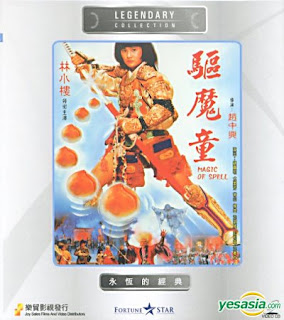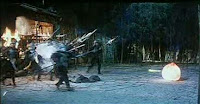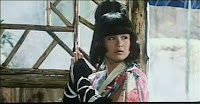 Director: Chung-Hsing Chao*
Director: Chung-Hsing Chao*
Release date: 1986
Contains spoilers
Magic of Spell – or Qu Mo Tong – is a Taiwanese movie based on the Japanese tale of ‘Momotaro, the Peach Boy’ and stars Lin Hsiao Lan as Momotaro. Last time we saw her in a movie it was in the madcap Kung Fu Wonder Child, in which she, like this, played a male role.
 The opening scene begins with a traveller walking along. The traditional Chinese music comes to an end as he falls, unable to see over the giant round of bread he eats, straight into a pothole. The music becomes a pratfall anthem – yes, he is our primary comedy character. He makes camp for the night and some corpses rise – rather zombie like for the two daughters and a skeleton for the father – and we get a physical comedy routine as he fails to notice them and asks his master (via a shrine) for help to combat his fear of the night.
The opening scene begins with a traveller walking along. The traditional Chinese music comes to an end as he falls, unable to see over the giant round of bread he eats, straight into a pothole. The music becomes a pratfall anthem – yes, he is our primary comedy character. He makes camp for the night and some corpses rise – rather zombie like for the two daughters and a skeleton for the father – and we get a physical comedy routine as he fails to notice them and asks his master (via a shrine) for help to combat his fear of the night.
There follows a title sequence in which we get to see the super strong and magical Momotaro in action. Be it lifting giant logs, saving drowning kids (that no one can be bothered swimming out to, it seems) or catching arrows in flight to save cuddly bunny rabbits we tend to get a measure of the boy.
 The film cuts to a castle where the forces of evil are filling a bath with blood for their evil elder. He is the vampire of our piece, old and corrupted he seeks the right level of vitality in the blood he bathes him to restore his youth. In younger form he does have fangs. He is also less than impressed that Momotaro has been able to bring peace and prosperity to the human world.
The film cuts to a castle where the forces of evil are filling a bath with blood for their evil elder. He is the vampire of our piece, old and corrupted he seeks the right level of vitality in the blood he bathes him to restore his youth. In younger form he does have fangs. He is also less than impressed that Momotaro has been able to bring peace and prosperity to the human world.
 In the world the comedy character (who is never actually named) comes upon a house where an old woman offers food to the shrine of her deceased husband. As he is in need, however, she gives him the food – she even lets him put some on his master’s shrine. It appears, therefore, that his master – a great Kung Fu Warrior is dead. She mentions her son and there is an argument over who is the greatest hero when Momotaro returns home. It seems that the peach boy is the master the comedy character has been searching for.
In the world the comedy character (who is never actually named) comes upon a house where an old woman offers food to the shrine of her deceased husband. As he is in need, however, she gives him the food – she even lets him put some on his master’s shrine. It appears, therefore, that his master – a great Kung Fu Warrior is dead. She mentions her son and there is an argument over who is the greatest hero when Momotaro returns home. It seems that the peach boy is the master the comedy character has been searching for.
 The latest mix of blood does not contain the vitality the elder needs to become young and his evil doctor suggests that they need the blood of 1000 virgins. This leads to a raid by the demons to steal the village children. The villagers go to Momotaro for help. He prepares to leave – telling the comedy character to be careful on their mission or the demons will drink his blood and eat his flesh. However, the evil doctor comes for Momotaro.
The latest mix of blood does not contain the vitality the elder needs to become young and his evil doctor suggests that they need the blood of 1000 virgins. This leads to a raid by the demons to steal the village children. The villagers go to Momotaro for help. He prepares to leave – telling the comedy character to be careful on their mission or the demons will drink his blood and eat his flesh. However, the evil doctor comes for Momotaro.
 In the ensuing fight Momotaro’s mother is killed and he is gravely injured by the forces of evil. He escapes death as the spirit of the peach (or something like that, I kid you not) is summoned. Yes we have a giant glowing peach firing magic rays at the baddies. Exactly why is never explained by the film – which refers to Momotaro as Peach Boy but does not explain his origins further.
In the ensuing fight Momotaro’s mother is killed and he is gravely injured by the forces of evil. He escapes death as the spirit of the peach (or something like that, I kid you not) is summoned. Yes we have a giant glowing peach firing magic rays at the baddies. Exactly why is never explained by the film – which refers to Momotaro as Peach Boy but does not explain his origins further.
 This confusion with regards the folklore then continues when we see the funeral of his mother and he and his companions leave to go to the demons’ castle. His companions are referred to in the Fortune Star subtitles as Monkey, Dog and Chicken – the traditional companions of Momotaro in folklore, well except that Chicken should be Pheasant. The film doesn’t explain this, or why they have joined Momotaro and the comedy character. They are just there and their appearance proves confusing.
This confusion with regards the folklore then continues when we see the funeral of his mother and he and his companions leave to go to the demons’ castle. His companions are referred to in the Fortune Star subtitles as Monkey, Dog and Chicken – the traditional companions of Momotaro in folklore, well except that Chicken should be Pheasant. The film doesn’t explain this, or why they have joined Momotaro and the comedy character. They are just there and their appearance proves confusing.
 Meanwhile humans and demons alike are trying to catch a ginseng boy – a 1000 year old piece of ginseng that can walk and talk. As things go on Momotaro befriends the ginseng and is the first to not suggest eating him. The ginseng wants to be Momotaro’s friend and whilst the peach boy sends him away for his own safety it is their friendship that will save the day.
Meanwhile humans and demons alike are trying to catch a ginseng boy – a 1000 year old piece of ginseng that can walk and talk. As things go on Momotaro befriends the ginseng and is the first to not suggest eating him. The ginseng wants to be Momotaro’s friend and whilst the peach boy sends him away for his own safety it is their friendship that will save the day.
 That involves actually using the manji symbol – or swastika as we know it – and I still appreciate films such as this and (the otherwise awful) Dragon Against Vampire take the symbol that has rightly become associated with evil and reclaim it as a Buddhist symbol of good. Remember that the Manji is, traditionally, a sun symbol so the elder is defeated – symbolically – by the sun.
That involves actually using the manji symbol – or swastika as we know it – and I still appreciate films such as this and (the otherwise awful) Dragon Against Vampire take the symbol that has rightly become associated with evil and reclaim it as a Buddhist symbol of good. Remember that the Manji is, traditionally, a sun symbol so the elder is defeated – symbolically – by the sun.
The film would be quite good – hokey effects aside – if it had cared to explain what was occurring a little more often. I am sure that those familiar with the Momotaro story would get more out of it but the film should stand alone and be watchable by those with no knowledge of the folklore tale it is based on. The comedy character was annoying in this also, his antics too silly (especially in the final battle) and without any pathos to counterbalance the comedy – being a bullied orphan was not pathos enough as it was a background mentioned in passing. That said, it was quite fun for what it was – though not the best of its ilk. 4 out of 10.
The imdb page is here. * the imdb entry had listed Chung Wu Ching as director, thanks to the posted comment I noticed that this might be erroneous. Checking imdb they have now (19/11/11) changed the director to Chung-Hsing Chao. I have changed this but if anyone can confirm this or knows if this is still erroneous I'd be grateful for the correspondence.
Tuesday, September 29, 2009
Magic of Spell – review
Posted by
Taliesin_ttlg
at
11:31 AM
![]()
Labels: blood demon, vampire
Subscribe to:
Post Comments (Atom)
















2 comments:
We at the Washington Psychotronic Film Society screened Magic of Spell from a video CD last year. I made a programme to accompany the film, and later left a post regarding the credits listed and my translation of them.
Many thanks for the links, I have edited the post in light of the erroneous information re the director.
Post a Comment